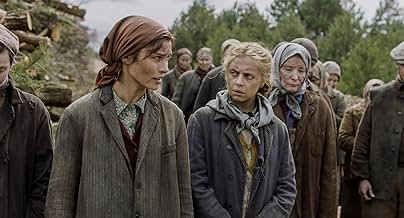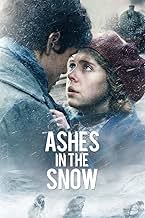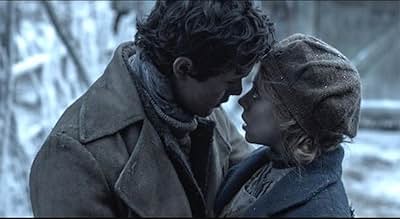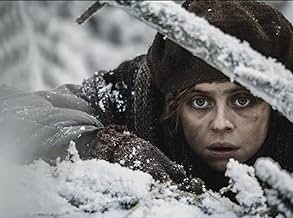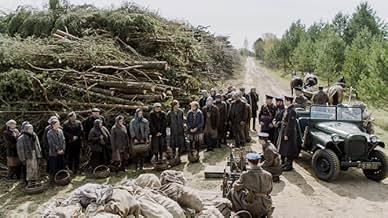AVALIAÇÃO DA IMDb
6,6/10
7,2 mil
SUA AVALIAÇÃO
Em 1941, uma aspirante a artista de 16 anos e sua família são deportados para a Sibéria durante o desmantelamento da região do Báltico por Stalin. A paixão de uma menina pela arte e sua espe... Ler tudoEm 1941, uma aspirante a artista de 16 anos e sua família são deportados para a Sibéria durante o desmantelamento da região do Báltico por Stalin. A paixão de uma menina pela arte e sua esperança eterna quebrarão o silêncio da história.Em 1941, uma aspirante a artista de 16 anos e sua família são deportados para a Sibéria durante o desmantelamento da região do Báltico por Stalin. A paixão de uma menina pela arte e sua esperança eterna quebrarão o silêncio da história.
- Direção
- Roteiristas
- Artistas
- Prêmios
- 6 indicações no total
Avaliações em destaque
While this is a story that needs to be told, somehow this film does not come together. The lead, Bel Powley, has a wide eyed look that seems to be almost a caricature of innocence. The attraction of the soldier and her mother does not have feeling and he is poorly explained. Some of the problem that the actors had was in the writing. For example nothing in the Bel Powley character showed the leadership as the dying mother declared. She showed innocence, not the clever reading of people that leaders have. Still there were touching moments and a history that should be known.
My wife and I watched this at home on DVD from our public library. Switching on subtitles during key scenes was nice, some of the mumbling with an accent was hard to understand.
This story is "inspired" by real events which means it is a fictional story representative of what happened back then, the 1940s, when Stalin's USSR was invading Eastern European countries and labeling residents as enemies, gathering them up and sending them to harsh labor camps. This story focuses on Lithuanians.
Bel Powley is the main focus, even though the actress was 25 or 26, she plays 16-yr-old Lina who has a knack for art - drawing, painting, these types of art. She is self-taught but her father hopes to get her admission to a formal art school. Right then, just after she receives her acceptance letter, is when her family and many others are forced into trucks then trains and shipped off to labor camps.
Of course part of the movie is to show how brutal the Soviets were but the main part is to show how people can work to maintain their dignity in such trying times. Interestingly, in the credits are a long list of "extras" who had ties to ancestors who had been imprisoned and mistreated during those times.
Good movie although hard to watch at times.
This story is "inspired" by real events which means it is a fictional story representative of what happened back then, the 1940s, when Stalin's USSR was invading Eastern European countries and labeling residents as enemies, gathering them up and sending them to harsh labor camps. This story focuses on Lithuanians.
Bel Powley is the main focus, even though the actress was 25 or 26, she plays 16-yr-old Lina who has a knack for art - drawing, painting, these types of art. She is self-taught but her father hopes to get her admission to a formal art school. Right then, just after she receives her acceptance letter, is when her family and many others are forced into trucks then trains and shipped off to labor camps.
Of course part of the movie is to show how brutal the Soviets were but the main part is to show how people can work to maintain their dignity in such trying times. Interestingly, in the credits are a long list of "extras" who had ties to ancestors who had been imprisoned and mistreated during those times.
Good movie although hard to watch at times.
Greetings again from the darkness. Most World War II films focus on the atrocities committed by Hitler's German forces, but this adaptation of Ruta Sepetys' novel ("Between Shades of Gray") reminds us of the evils under Stalin and the Russian seizure of the Baltic States. Director Marius A Markevicius delivers a feature film debut that is both historical drama and tale of human perseverance.
We have long since been educated on just how cruel humans can and have been to other humans, and director Markevicius - with a script from Ben York Jones (LIKE CRAZY, 2011) - doesn't shy away from the cruelty or atrocities, but he and cinematographer Ramunus Greicius capture the harshness and brutality of the Siberian environment, as well as the brief moments when those being held captive feel sparks of life.
Bel Powley (THE DIARY OF A TEENAGE GIRL, 2015) stars as Lina, a young Lithuanian artist who lives with her family: mother Elena (Lisa Loven Kongsli, FORCE MAJEUR) and brother Jonas (Tom Sweet). The father/husband is played by Sam Hazeldine and we learn of his secret agenda and activism later in the film. When Russian troops forcibly remove mother and the two kids from their home, a long train ride ends with their working the fields in the Altai Labor Camp in Siberia.
Martin Wallstrom is excellent as Kretzky, a conflicted Russian soldier from the Ukraine. He's kind of persona non-grata on both sides, and as an outsider to the troops and the "devil" to the prisoners, he is somewhat of a sympathetic character. A year later (1942), the family and Officer Kretzky are shipped off to Laptev Sea in the Arctic Circle. This frozen tundra is no place for human beings and death seems preferable to freezing in misery. When giving the relocation order, Kretzky's commanding officer calls them "one big happy family in frozen hell". It's a great line. An acutely descriptive line.
Young Lina's childhood innocence has been shattered, but she possesses an inner strength that only such miserable circumstances could unveil. She carries on finding brief respites in her art and in fleeting romance with fellow prisoner Andrius (Jonah Hauer-King).
There is a story told, a legend really, about a fishing boat and its survivors - the correlation made late in the film. The devastating circumstances and desolate landscape are accompanied aptly by German composer Volker Bertelmann. But let's face it, war crimes against the innocent are tough to watch even in movie form, and this film, regardless of how expertly it's crafted, is relentless in bleakness - though heartfelt and sincere.
We have long since been educated on just how cruel humans can and have been to other humans, and director Markevicius - with a script from Ben York Jones (LIKE CRAZY, 2011) - doesn't shy away from the cruelty or atrocities, but he and cinematographer Ramunus Greicius capture the harshness and brutality of the Siberian environment, as well as the brief moments when those being held captive feel sparks of life.
Bel Powley (THE DIARY OF A TEENAGE GIRL, 2015) stars as Lina, a young Lithuanian artist who lives with her family: mother Elena (Lisa Loven Kongsli, FORCE MAJEUR) and brother Jonas (Tom Sweet). The father/husband is played by Sam Hazeldine and we learn of his secret agenda and activism later in the film. When Russian troops forcibly remove mother and the two kids from their home, a long train ride ends with their working the fields in the Altai Labor Camp in Siberia.
Martin Wallstrom is excellent as Kretzky, a conflicted Russian soldier from the Ukraine. He's kind of persona non-grata on both sides, and as an outsider to the troops and the "devil" to the prisoners, he is somewhat of a sympathetic character. A year later (1942), the family and Officer Kretzky are shipped off to Laptev Sea in the Arctic Circle. This frozen tundra is no place for human beings and death seems preferable to freezing in misery. When giving the relocation order, Kretzky's commanding officer calls them "one big happy family in frozen hell". It's a great line. An acutely descriptive line.
Young Lina's childhood innocence has been shattered, but she possesses an inner strength that only such miserable circumstances could unveil. She carries on finding brief respites in her art and in fleeting romance with fellow prisoner Andrius (Jonah Hauer-King).
There is a story told, a legend really, about a fishing boat and its survivors - the correlation made late in the film. The devastating circumstances and desolate landscape are accompanied aptly by German composer Volker Bertelmann. But let's face it, war crimes against the innocent are tough to watch even in movie form, and this film, regardless of how expertly it's crafted, is relentless in bleakness - though heartfelt and sincere.
For fans of Between Shades of Gray by Ruta Sepetys, the book from which it was adapted from, it was a disappointment. I have read the book so many times and it never fails to make my heart hurt. When I heard that it would be adapted into a movie, I prepared my heart and a box of tissues for it. I was so excited for it. Sadly, they were not needed. For non readers of the book, they would probably be more accepting of this movie. To the readers and fans, they kinda cheated on by removing parts of the book that were the most heartbreaking, changing certain parts in the story and overall failing to show and evoke emotions like despair, anger, hurt...emotions I certainly felt all throughout the book. There was nothing memorable with the movie. I did not connect with any of the characters. Tbh during some major plot points they decided to keep (although there were changes, most of them big ones), I was thinking this is it, this will be the part which would change my mind about this movie but after seeing it, my reaction was meh, that was it? They really could have done a better job with the screenplay. Will I watch it again? Sorry, hard pass for me. I'd just stick with the book.
'Ashes in the Snow' is a war drama that tugs at the heartstrings. Note, this is not a film about soldiers on the battlefield. Instead, it concentrates on how it affects the people, and in particular Lithuanians.
One can only cringe at the inhumane things humans did during war, simply because their government expected it of them. It turned ordinary men into coldblooded killers. This film also showed us the reluctant soldiers. Men who found themselves in situations they dreaded. Yet, they still had orders to follow...
The acting is very good, especially Bel Powley as heroin Lina. We follow her family as they are taken from the comfort of their home, to a six-week long harrowing journey on a train, to a prison camp in Siberia, and finally to the freezing Laptev Sea. This is an emotional and heartfelt journey sure to set emotions in motion.
One can only cringe at the inhumane things humans did during war, simply because their government expected it of them. It turned ordinary men into coldblooded killers. This film also showed us the reluctant soldiers. Men who found themselves in situations they dreaded. Yet, they still had orders to follow...
The acting is very good, especially Bel Powley as heroin Lina. We follow her family as they are taken from the comfort of their home, to a six-week long harrowing journey on a train, to a prison camp in Siberia, and finally to the freezing Laptev Sea. This is an emotional and heartfelt journey sure to set emotions in motion.
Você sabia?
- Curiosidades"Ashes in the Snow" is the #1 highest box-office grossing film of all-time in Lithuania, the country where the story and production took place, beating out such mega studio titles as "Avatar" and "50 Shades of Grey".
- Erros de gravaçãoIn the scene with the sled dogs, the dogs are connected wrong. The ganglion hitch is used in North America. In Russia, they would use a fan hitch.
Principais escolhas
Faça login para avaliar e ver a lista de recomendações personalizadas
- How long is Ashes in the Snow?Fornecido pela Alexa
Detalhes
Bilheteria
- Orçamento
- US$ 5.000.000 (estimativa)
- Faturamento bruto mundial
- US$ 1.578.991
- Tempo de duração1 hora 38 minutos
- Cor
Contribua para esta página
Sugerir uma alteração ou adicionar conteúdo ausente

Principal brecha
By what name was Retratos de uma Guerra (2018) officially released in India in English?
Responda


